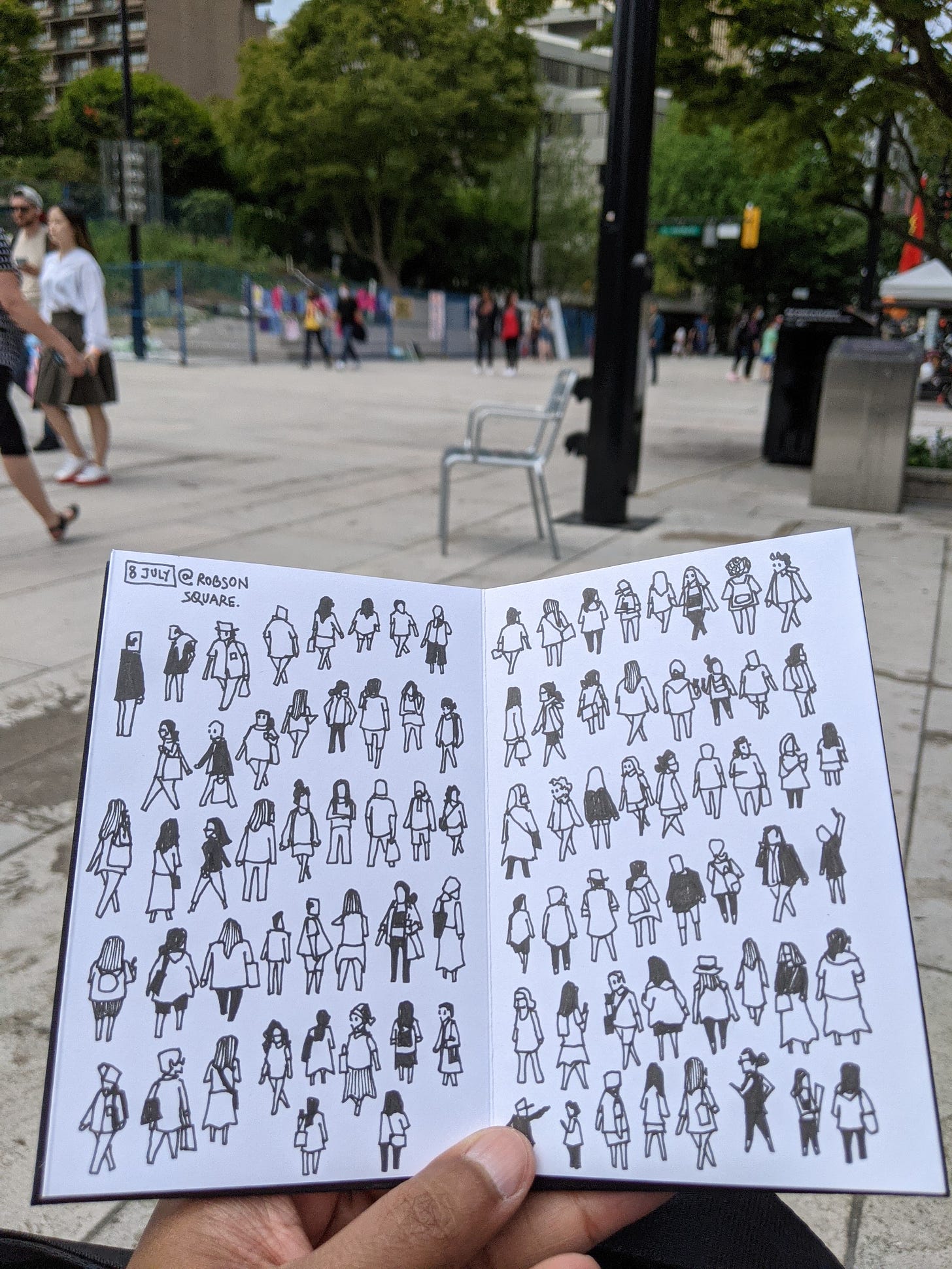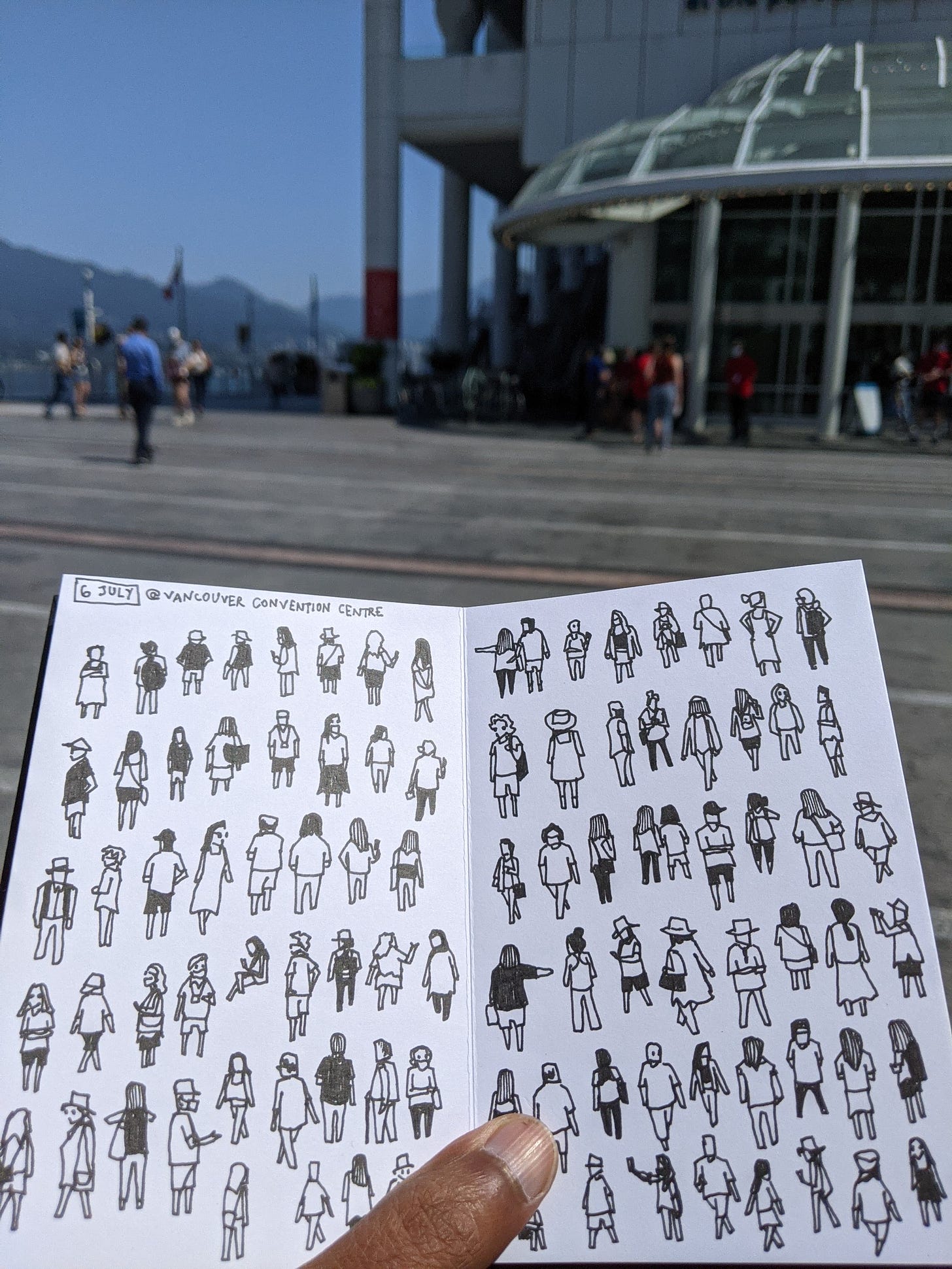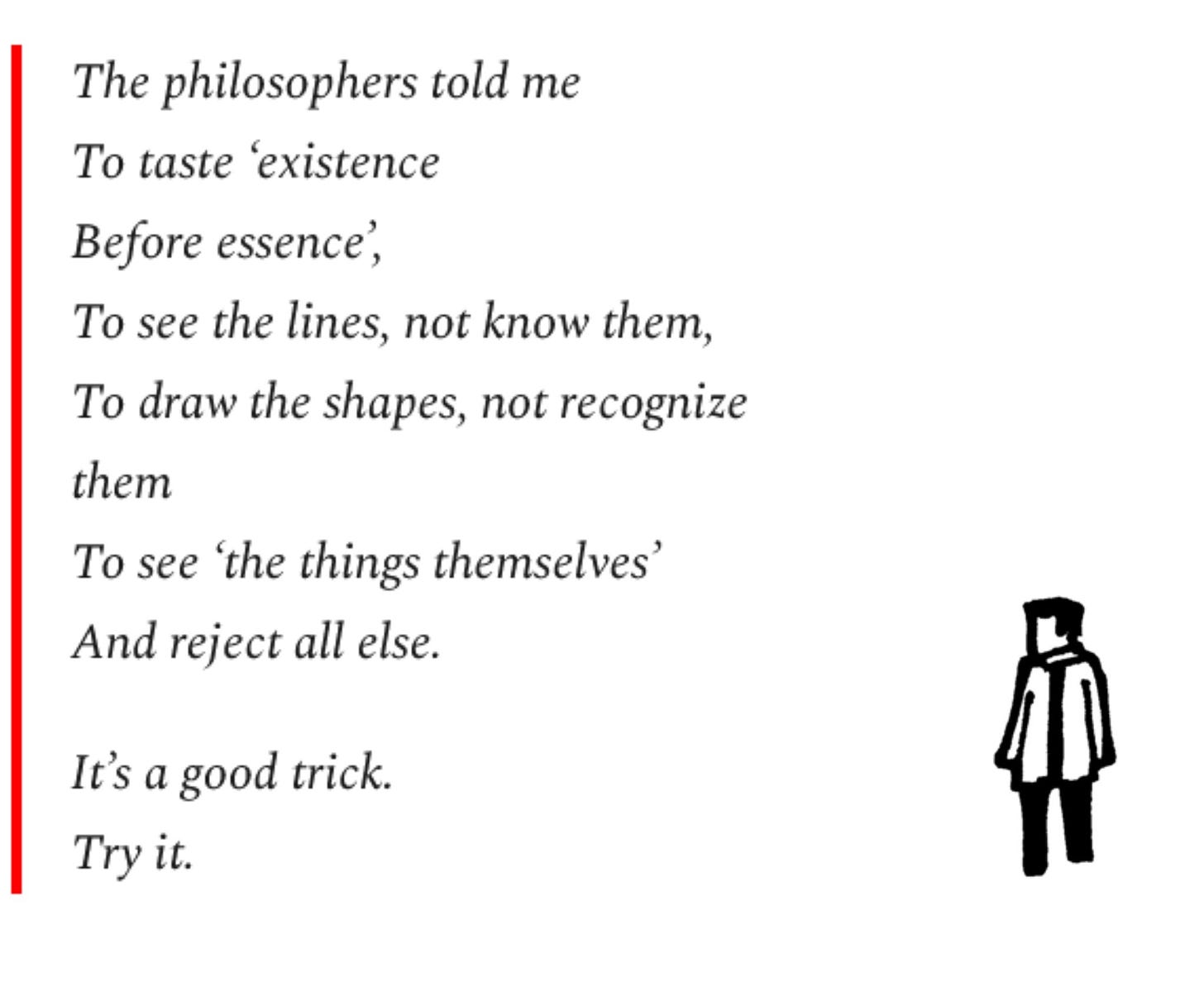In this issue, I share some Tiny People of Vancouver and thoughts on existentialism. Welcome, new subscribers. If you like what you see, share this newsletter with a friend!
Last Week, I talked about…
Ep 21 of the SneakyArt Podcast, a conversation with painter and storyboard artist Alex Hillkurtz.
The Game of Tiny People
I love to draw tiny people. It is a game I play versus reality, and it is a game of speed and dexterity and instinct. Here is how it goes.
Reality makes the first move. It flaunts itself, strutting like a peacock across space and time. It puts on a great show with colors and shadows and shapes and lines. It does not wait for me to notice. In seconds it is gone, replaced, without a trace. I watch intently.
I swiftly make my moves. With my eyes I reach out to grasp reality. I make impressions of it. I turn them over in my mind. Some things I discard, others I keep. I put them down on my page as lines in ink.
So the game is this - I must try to capture reality before it escapes. I win some, I lose some. It is fun to play.
Here are some results from this week’s game of tiny people.
I draw each of these two-page spreads in about an hour. For the one below, someone on my Instagram counted to tell me that it’s exactly 100 people. So I drew 100 people in 60 minutes, which comes to 1.6 people per minute!
Tiny people have a lot to say. These portraits, distilled out of so much reality, nonetheless possess a distinct personhood. They have personality, pose, character, fashion, and hair-styles. This means that while you may never have visited Vancouver, it is still possible you recognize some of them.
Maybe they resemble someone in your world - someone you’ve seen on your streets or in your cafes. Someone you have not paid much attention to, just a side-character on the edges of your vision.
Tiny people populate your world, and add to its richness and depth.
The Existentialism of Tiny People
Here is something to consider. You also populate their world. In their world, you occupy a place not unlike the one they occupy in yours - nearly out of sight, and nearly out of mind. Some years ago, I learned this word from the Dictionary of Obscure Sorrows.
If you can dwell on sonder, and appreciate the beauty of what it means, you are ready to make an important philosophical breakthrough.
.
.
.
One of Jean-Paul Sartre’s most famous quotes is this,
Hell is other people.
It does not mean other people are terrible. It means that other people externalize us to ourselves. Taking Sartre’s example, imagine yourself walking alone in a park. Everywhere you look, everything presents itself to you. You are the subject around whom the universe shapes itself.
Then, another person appears. And immediately the equation changes. Whether you like it or not, you are suddenly conscious that the other person also exists in their own universe. Inside that universe, you are just another object. You are no longer able to see yourself as the subject. Suddenly all sorts of “object words” run through your mind. Are you thin, or do you look fat? Are you standing straight, or are you slouching? Are you dressed well? Is your hair in place? Or, for our current times, are you wearing your mask? Being subject to such judgments in your mind, simply because of the appearance of another person in your world, is what Sartre describes as hell.
It is the transformation of self from subject to object that externalizes us. Existentialist philosophers have pondered over this small but significant fact for a very long time. Hegel analyzed how rival consciousnesses wrestle for dominance in a master-slave dynamic. Who has control? Who sets the narrative? The master perceives everything from their own viewpoint, and the slave perceives even their own self from the viewpoint of the master. We need not think about literal slaves here. Any of us could be a ‘slave’ in various social situations, e.g. beta-personalities confronted by alpha-personalities.
It is a feeling often described as becoming self-conscious. “Don’t be so self-conscious,” people will tell you.
Or, “It’s nothing, you’re just being self-conscious.”
Or, “Why do you have to be so self-conscious all the time?”
Here’s another glass-shattering moment from Sarah Bakewell’s “At the Existentialist Cafe”. In her groundbreaking book on feminism - “The Second Sex” - Simone de Beauvoir details how the lived experiences of women are fundamentally different from men. Men are conditioned to see themselves as free agents, as creators, as observers, as controllers of their destiny and their world. But women are conditioned to see themselves as “objects”, to externalize themselves to the male gaze. To be self-conscious. To be free, the slave must rebel against the master and reassert their self-identity.
Reading this passage made me acutely conscious of how much insight we lose in our histories, philosophies, and sciences, when we only consider the male perspective. We only understand about half the world, and sometimes less.
A Poem to Summarize
Recommendations
On the subject of male-bias in histories, read Ira Mukhoty’s fantastic book - “Daughters of the Sun” - about the queens and begums of the Mughal empire.
Listen to the music and lyrics of Joni Mitchell.
Read this article on “The Revival of Stoicism”
Read these notes from my experience drawing with other people this week
Thank you for your time and attention. I will see you next week with a fascinating new episode of the SneakyArt Podcast, and some more ideas.















10/10 content and coolest thing I've seen this week
This is very thoughtful provoking! And your portraits are amazing!